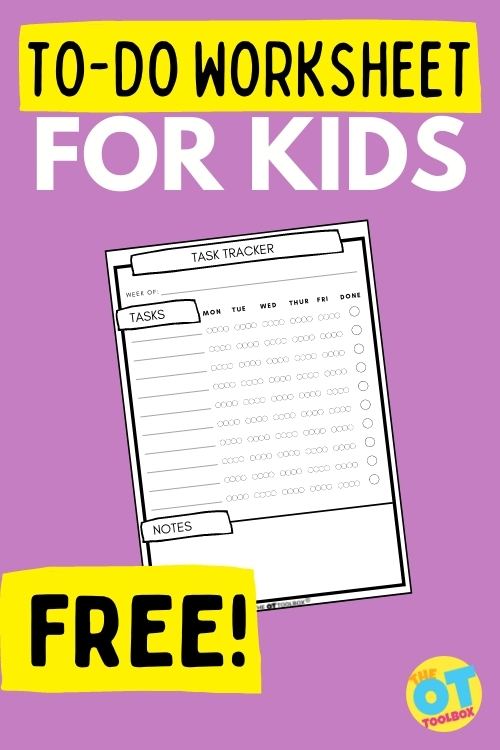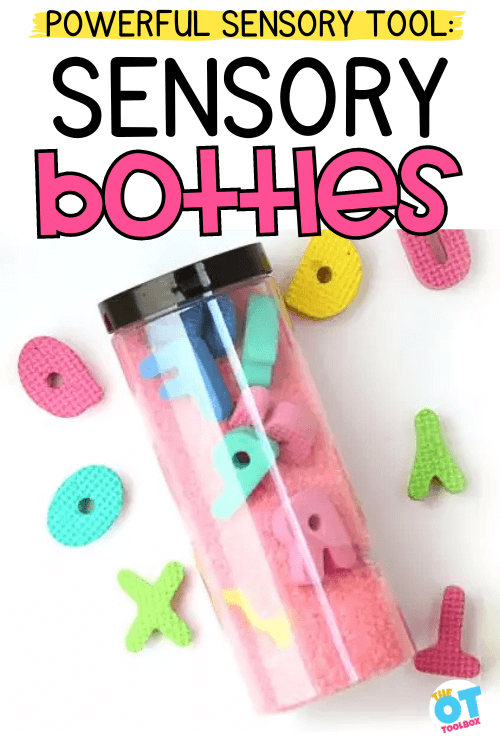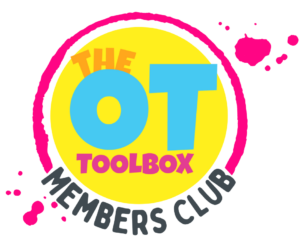In this blog post you’ll discover Strategies to Help Combat Executive Function Disorder including a task completion worksheet, designed as a to-do list for kids. This task tracker worksheet allows kids to keep track of their daily tasks, through development of executive functioning skills like task initiation and task completion.

To-Do Lists for Kids and Executive Function
First, let’s cover executive functioning. Does it have to do with how high powered executives function? Not, really, but there may be some meaning behind their title, “executive.”
According to the reviewers at Psychology Today, executive function is a mental process to help people, plan and execute their goals. They include attention, working memory, problem solving, task initiation and impulse control.
Development of Executive Functioning skills
About development of executive functioning skills: These functions are believed to be housed in the prefrontal cortex. Because it is right at the front, we know it has to be important, right? Correct. These are the important life skills that one needs to succeed in life. These skills start in infancy but do not fully develop until the 20’s or 30’s! This is the reason your college student is so scattered, impulsive, and needy.
My own observations lead me to believe the prefrontal cortex is becoming developed later and later in a person’s life. Thirty years ago, these processes were well developed by 18. Now “children” well into their twenties are relying on their parents and teachers for advice, or using maladaptive coping strategies for assistance.
How does this relate to the high powered executive?
In order to become and thrive as an executive, often at the top of their field, people need to have excellent task management skills, emotional regulation, organization, leadership, and the ability to multitask. Interestingly enough, these are all of the buzzwords included in job descriptions and resumes, because they are the measure of success in a job.
Children and adults who struggle with these executive function skills are likely to have difficulty managing their time, starting and finishing tasks, following mult-step directions, and staying organized. The coworker with the messiest office, who is always losing things, is often struggling with executive function.
Does this mean people with executive function disorder (EFD) are less intelligent than their counterparts?
Not necessarily. While high executive function skills can often be paired with a higher IQ, people with a lower EF learn to cope with their inability to perform these tasks. They use strategies to compensate, and often succeed.
This sounds a lot like Attention Deficit Disorder (ADD)! It does. Often those diagnosed with ADD have executive function disorder as part of their set of symptoms. They also exhibit additional symptoms such as impulsive behavior, difficulty with emotional regulation, inability to maintain attention even in an optimal environment or with a preferred task.
For more information on executive functions and the disorders associated with them, this article in psychology today is informative and thorough in describing EF skills and related challenges.
How to support Task Completion
Now that I have identified that half of my caseload has executive function disorder, what strategies can I use to combat this and help develop these skills?
Once you identify which of the executive functions are not well developed, each can be worked on individually, or a program of strategies to assist your student with overall executive function is useful.
The OT Toolbox has some great free printables to assist with strategies for executive function disorder.
Kids To-Do List
Below, you can access our free Task Completion Checklist. This to-do list for kids breaks down tasks into a list with check boxes. Kids, and the support system they are utilizing (teachers, parents, therapists, caregivers, etc.) can identify and itemize the tasks that the student needs to achieve on a daily or weekly basis.
The kids to-do list is broken down into a list so that the user can see each step. The printable daily task list is open-ended so that steps can be listed out on each line, or multiple steps can be indicated in a single task.
For example, when a student needs to gather their backpack to go to school in the morning, there are several steps to that daily chore. The individual steps can be indicated on the to-do list.
Use the to-do list in a few different ways
- Add daily tasks
- Break down complex tasks like getting ready to leave the house in the morning
- Add tasks that include several steps
- Include tasks that need to be done several times/day such as turn off the lights when you leave a room
These can be used as stand alone activities, or part of your student’s strategy notebook. In this notebook several activities and strategies can be collected and placed in plastic sleeves for easy access and reference.
This printable to-do list can be used with older individuals as well, from teens on through adults.
This printable to-do list can also be utilized to support the adult with executive function disorder.
More Task Completion Strategies
If your prefrontal cortex is developed, or you have good executive function, you probably already use strategies to stay on top of your game. I can think of ten strategies I use to make sure I don’t forget anything.
- Lists on my phone
- Calendars
- Reminder messages on my phone
- Written schedule
- Routines
- Alarms
- Sticky notes
- Asking other people to be accountable to remember their own appointments
- Putting things away in the same place each time
- Staying organized and clean
Even though my executive function skills are well developed, stressful situations can destroy even the best skills. Therefore I have many strategies in place so I do not forget important events, where I put things, which students I am seeing, what is on the grocery list, and so forth.
This comes naturally to me as I am an organized person. For others, this will be challenging, and needs to be taught. Start to develop these strategies and coping mechanisms while your students are young.
There are other resources available on the OT Toolbox, such as the impulse control journal by Colleen Beck. Details about The Impulse Control Journal:
“This 80 page impulse control journal for kids to keep track of their day
- 30 Drawing Journal Pages to reflect and pinpoint individual strategies
- 28 Journal Lists so kids can write quick checklists regarding strengths, qualities, supports, areas of need, and insights
- 8 Journaling worksheets to pinpoint coping skills, feelings, emotions, and strategies that work for the individual
- Daily and Weekly tracking sheets for keeping track of tasks and goals
- Mindset,Vision, and Habit pages for helping kids make an impact
- Self-evaluation sheets to self-reflect and identify when inhibition is hard and what choices look like
- Daily tracker pages so your child can keep track of their day
- Task lists to monitor chores and daily tasks so it gets done everyday
- Journal pages to help improve new habits
- Charts and guides for monitoring impulse control so your child can improve their self-confidence
- Strategy journal pages to help kids use self-reflection and self-regulation so they can succeed at home and in the classroom
- Goal sheets for setting goals and working to meet those goals while improving persistence
- Tools for improving mindset to help kids create a set of coping strategies that work for their needs
Click here for more information on The Impulse Control Journal to support completion of daily tasks.
Do not despair! Most children grow up to be functioning adults. They leave the nest (or basement) eventually, and find their way. We can however do our part in teaching these strategies early and consistently, so they fly out of the nest instead of falling head first.
Free To Do List for Kids
Want a copy of this task completion worksheet? Print off this to-do list for kids and support development of executive functioning skills, for any age!

Victoria Wood, OTR/L is a contributor to The OT Toolbox and has been providing Occupational Therapy treatment in pediatrics for more than 25 years. She has practiced in hospital settings (inpatient, outpatient, NICU, PICU), school systems, and outpatient clinics in several states. She has treated hundreds of children with various sensory processing dysfunction in the areas of behavior, gross/fine motor skills, social skills and self-care. Ms. Wood has also been a featured speaker at seminars, webinars, and school staff development training. She is the author of Seeing your Home and Community with Sensory Eyes.


